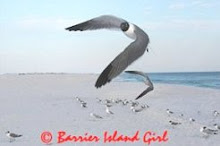Time for just a few notes today:
1. Oiled and Dying Birds.
U.S. Fish and Wildlife officials are beginning to get reports of oiled, dying, and dead sea birds along Pensacola Beach and in Gulf Breeze. Officials have important advice for would-be rescuers:
Travis Griggs for the PNJ reports on the abominable state of the beach after this week's attempts to clean it:
U.S. Fish and Wildlife officials are beginning to get reports of oiled, dying, and dead sea birds along Pensacola Beach and in Gulf Breeze. Officials have important advice for would-be rescuers:
Don't attempt to rescue these animals yourself. You could do more harm than good. To report oiled or injured wildlife, call (866) 557-1401.2. Oil Scraping.
Travis Griggs for the PNJ reports on the abominable state of the beach after this week's attempts to clean it:
Despite intensive efforts by more than 1,100 workers and heavy equipment to clean thick tar from Pensacola Beach overnight Wednesday, massive sheets of oil remained buried in the sand.Last evening, he writes, "At a glance, it appeared at least 90 percent of the oil was gone" from the so-called 'clean' section of beach across from Peg Leg Pete's.
An 8-mile stretch of Pensacola Beach that was covered with gooey oil Wednesday appeared to be clean when the sun came up Thursday. But researchers from the University of South Florida and news reporters discovered that oil is buried from about 1 inch to 8 inches deep.
Scattered tar balls and a few bigger chunks of fresh crude were all that remained on the surface. But when the reporter dug about an inch into the wet sand near the high tide line, his fingers sank into thick sheets of tar.You can't say we -- and BP, and MMS, and the entire oil industry -- weren't warned.
As we related here shortly after the oil spill began, the Exxon Valdez tanker spill should have taught a lesson. Nearly twenty years after that oil spill, an EPA regional research center scientist from Pensacola Beach who visited there told us some time ago, "years and years of beach cleaning... barely 'whitewashed' the appearances of things in Prince William Sound. 'Dig down an inch or turn over a rock,'" as he said, "and it's still there. The entire food chain was broken.'"
Scientific American had more on the same subject a couple of years after our conversation with the Pensacola Beach scientist.
3. Red Lobster Drops Oysters.
Speaking of the food chain, so long oysters. Red Lobster is dropping them from the menu. All of the restaurant chain's oysters come from a Louisiana plant.
3. Red Lobster Drops Oysters.
Speaking of the food chain, so long oysters. Red Lobster is dropping them from the menu. All of the restaurant chain's oysters come from a Louisiana plant.
Oysters are not at the bottom of the food chain, but they're not a bad canary-in-the-coal mine for what's happening to it.
Most beach residents are realizing, now, that their lives will never be the same again. While the nation as a whole is paying attention to our plight, it hasn't fully awakened to the fact that the BP oil spill will be changing much for them, too, and not just on the dinner plate or in their family vacation schedules.






No comments:
Post a Comment